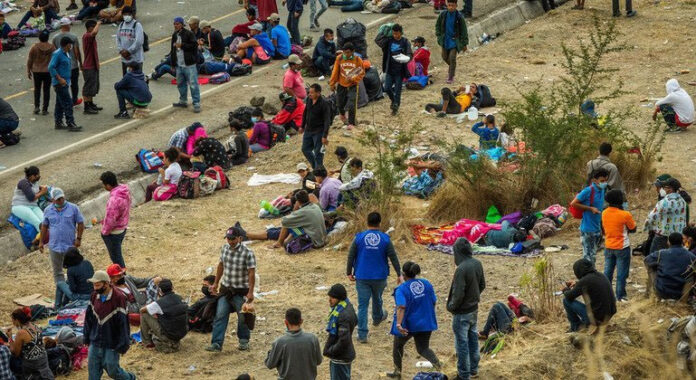It is very sad to see how millions of Latin American brothers and sisters, along with other nationalities from around the world, overflow the border to enter the United States, with the hope of achieving relief from their misfortunes, from their lack of opportunities that they do not obtain in their countries of origin, to be able to live a comfortable and prosperous life.
The desperation in which those human beings live who were not able to fulfill a dream of getting ahead economically for the happiness of their families in their countries, is painful.
I’m sitting at a table in a Nicaraguan restaurant eating a delicious fish fillet with gallo pinto and slices of ripe plantain. Sitting next to me is a Puerto Rican lady who once said that she was 93 years old. She arrives with her caregiver almost every day to taste the dishes at Las Tinajas Restaurant in SF.
My concentration on my food is taken away by a woman who approaches the old lady and asks her if she needs someone to work in her house, or if she does know where they need someone.
The old lady answers that she does not, and after an exchange of words, the woman approaches a worker who came to pick up the dirty dishes from the table.
The woman asks the worker if they need someone to work. She answers no.
Then the woman is about to leave the restaurant, and it occurred to me to call her. “Hello, excuse me,” I said. She turns to look and approaches me.
“What do you know how to do?” I asked her.
“Well, anything, cleaning houses, helping in a restaurant…”
I invited her to sit at my table so she can tell me more about her situation. She starts to tell me that she is from Nicaragua, without knowing that the restaurant she is in is Nicaraguan.
“This restaurant is Nicaraguan,” I said. “Oh yes,” she answers, surprised.
“Yes,” I replied.
She tells me that she has been in the US for three months and that since she arrived she has not found a job, even though she has been knocking on doors from business to business in search of employment. She has work permit. That she lives with her girlfriend in a nearby city and that she gets around by train (BART or Metro) and on an electric scooter that her friend lends her, who is the one who petitioned her through the expanded humanitarian parole program that the United States launched in October 2022 for Venezuelan migrants and was later expanded to Cuba, Nicaragua and Haiti, for a two-year permit.
Guessing that maybe she hadn’t eaten I ordered her a plate of food and gave her $20.
She accepts them from me with regret, with a “don’t worry…” I figured it would help her.
I gave her several contacts of restaurant owners that I know to contact them.
On another occasion as I am walking on the sidewalk on Mission Street in the Mission District of San Francisco, something catches my attention.
“Fresh arepas,” I think the sign said, which a very nice young woman with a complacent smile held up and showed to those who passed by.
I was curious and asked her where she was from. She told me that she was from Venezuela, and that she had been in the United States for several months. She told me that in her country she had studied industrial engineering, that she had a little girl and that they lived with her husband. I marveled at her effort and creativity.
Another day, on the same Mission Street, a woman who was about 7 months pregnant was with her husband offering “fruit drinks, delicious and all natural, without sugar,” and sweet biscuits, in a cart. I bought her a glass, and it was delicious. She charged me $10.
The number of professionals who are in strange lands, without the English language, and who knows with what housing limitations, looking for their daily bread, without being able to work in their respective professions, and many times without being able to get a job, is sad.
The majority have abandoned everything in their countries: husbands or wives, dependent children, their houses where perhaps they did not pay rent, and on top of that many have pledged their properties at high interest rates, which they may lose if they do not find work soon after arriving here. And the greatest sadness: not knowing the language, which makes them vulnerable to being exploited, humiliated and discriminated against.
In large cities like New York and Chicago, local people are already rising up against their mayors and politicians for promoting the reception of these refugees, as the cities are providing services and resources that they claim, “should be used in the local communities”, which is risking these cities to go bankrupt economically.



